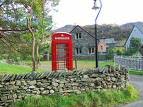English wines have a character and style that has enabled them to excel in International competitions against some of the best producers in the world.
British Products Directory homepage links
British Glass
Prior to the late seventeeth century, table glass made in Britain copied the European and Venetian styles. However, with the development of lead crystal by George Ravenscroft in 1674 glassworkers were able to make heavier glassware and began to develop the English style.
Further refinements to the glassmaking process during the 18thC allowed the glass to be cut and engraved. By this time Britain was well populated with glassworks including London, Birmingham, Bristol, Newcastle, Stourbridge, Scotland and Ireland.
During the 19thC and early 20thC Stourbridge ranked as Britain's leading area for blown glass, producing some of the finest examples of cameo, crystal, cased, applied and coloured glass along with cutting and engraving of the highest quality.
The 20thC however has witnessed the demise of the many major British glassworks and within the last decade, the closing of almost all the remaining large glass companies based around the Stourbridge area.
With the closure of these large glass companies, there has
appeared a resurgence of small workshops populated by studio
craft artists, inovating and developing new styles and designs.
Once again putting British made glass back on the international
stage.
Local Produce
With the increase in the number of farm shops and nearly 300 farmer's markets across the country, more and more people are now buying local produce.
Contrary to popular belief, buying local produce actually increases the consumers' choice, as many more varieties of produce are available than can be found on the supermarket shelves.
Buying local produce also helps the environment and our
health.
- Local produce does not need to be transported long distances
and requires less packaging.
- Less intensive farming requires less in the way of pesticides
and fertilisers and organic produce is now widely
available.
- By not restricting our choice of varieties, as the
supermarkets do, we are helping to maintain bio diversity.
- Moreover fresh food not only tastes good but is also more nutritious
We also help our local communities by buying locally. We stimulate trade, help local employment, support small business and help stop the decline of our towns and villages.
Good Food Pages lists all the very best food and drink producers and retailers in the UK, many of which offer organic and free-range produce
Big Barn can also help you find local produce. Their website
also includes recipes and very good articles on food and
farming.
No longer made (or so we thought)
For many years Britain led the world in developing standards, perhaps most notably in engineering.
During the industrial revolution, the development of standard metal sheet gauges and standard threads for screws, nuts and bolts allowed machines to be made with a high degree of accuracy. These in turn could then be used to make accurately dimensioned components.
Engineers will remember; British Standard Whitworth (BSW), British Association (BA) British Standard Pipe (BSP), British Standard Fine (BSF) and even a standard for cycle threads - British Standard Cycle (BSC). Many of these are still being used but are no longer widely available.
More information on the history of British threaded fasteners can be found at: American Motorcyclist Association
Throughout British industry, products were made using standards based on imperial measurements, from engines through to building bricks.
In later years, these standards have been superseded by the metric system and although in many instances the metric equivalent to the imperial size is acceptable, in other cases it is not.
In restoration or even repair, it is generally important that an exact match is used rather than an equivalent.
This section of the British Products Directory hopes to
address this problem.
Area
Related Links
Expats








